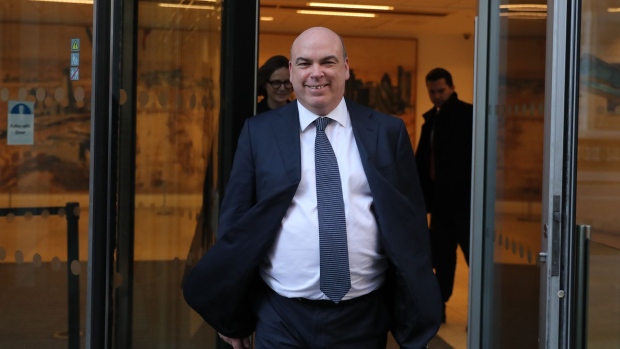Jan 28, 2022
U.K. Tycoon Lynch Ready for Fraud Verdict in Epic HP Court Fight
, Bloomberg News

(Bloomberg) -- British software tycoon Mike Lynch took a huge gamble when he decided to fight a civil case brought by Hewlett Packard Enterprise Co. in a U.K. court. After a nine-month trial and a two-year waiting period, he’s about to find out if his decision will pay off.
Rather than face the U.S. Department of Justice and criminal charges of fraud, Lynch instead first opted to fight HP and its civil claim in London.
The case focused on events leading up to HP’s $11 billion takeover in 2011 of Lynch’s firm, Autonomy Corp. HP alleged that Lynch inflated the value of Autonomy; Lynch argued that HP management simply ran his company into the ground.
HP wants $5 billion in damages from Lynch and Sushovan Hussain, Autonomy’s former finance director. Now, almost two years after Lynch walked out of the civil court -- a moment before the Covid-19 pandemic hit Britain -- High Court Justice Robert Hildyard is set to outline his findings.
Here are some of the key things to look out for:
HP’s central allegation of fraud
The two sides clashed during the trial over whether Autonomy bent the rules to beat stock market expectations, effectively deceiving HP. The Silicon Valley hardware giant paid $11 billion to acquire Autonomy, only to write down the value by $8.8 billion a year later.
The verdict hangs on whether the judge believes Lynch and his subordinates deliberately inflated Autonomy’s value. He’s accused of using undisclosed hardware sales and “contrived” contracts with friendly resellers to boost Autonomy’s revenue as quarters were coming to an end.
Dec. 2019: HP Says Lynch Told ‘Lie After Lie’ as $5 Billion Trial Wraps
Lynch’s personal role
HP’s attorneys characterized Lynch as a controlling and dishonest chief executive officer with intimate knowledge of his company’s accounting practices. Lynch argued that HP spent millions of dollars and failed to tie the Autonomy founder to any wrongdoing.
In reality, HP brought the case because it was suffering from “buyer’s remorse,” Lynch’s lawyer Robert Miles said. “Even where arguably there is some evidence of wrong taking place,” there is none to show Lynch was involved or even aware of it, he said.
Jan. 2020: Lynch’s ‘Unusual Level of Control’ at Autonomy Worries Judge
HP’s management of Autonomy
The lawsuit also looked at whether HP sufficiently scrutinized Autonomy’s books before the deal, in a period when the computing giant sought to transform itself into a software-focused company only to change course months later.
Lynch’s attorney used internal company documents to argue the case was a function of infighting at HP, where top executives disagreed about the Autonomy purchase and the board wavered on strategy.
Former HP chief Meg Whitman, who testified at the trial, was forced to confront emails where she wrote that she was prepared to throw her predecessor “under the bus” to deflect blame over the failed deal.
June 2019: Ex-HP CEO Whitman Email Said She’d ‘Throw Leo Under the Bus’
Where did any harm take place?
Lynch and his legal team will be looking to Hildyard’s ruling for clues on where the judge deems any harms to have taken place.
Though extradition proceedings are proceeding separately, Lynch’s chances of staying away from the U.S. criminal justice system depend to a significant degree on where Hildyard rules that any misconduct took place -- and whether HP itself suffered harm.
Lynch is expected to argue that a person should not be extradited if the alleged offenses could have been tried in the U.K.
Feb: 2021: Tech Tycoon Warns of U.S. Overreach in Extradition Fight
©2022 Bloomberg L.P.





